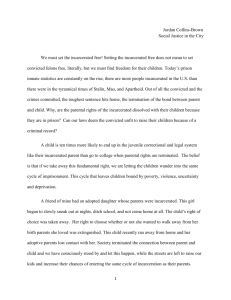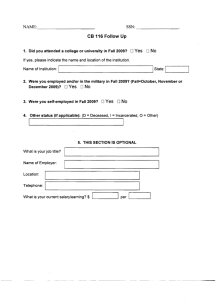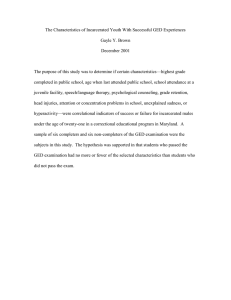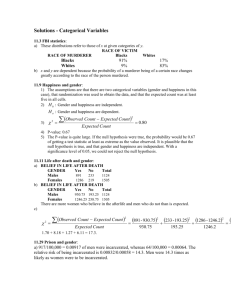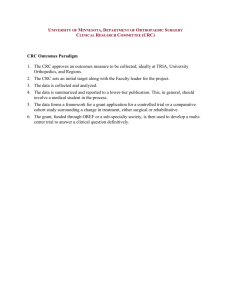UNEDITED VERSION Committee on the Rights of the Child 58
advertisement
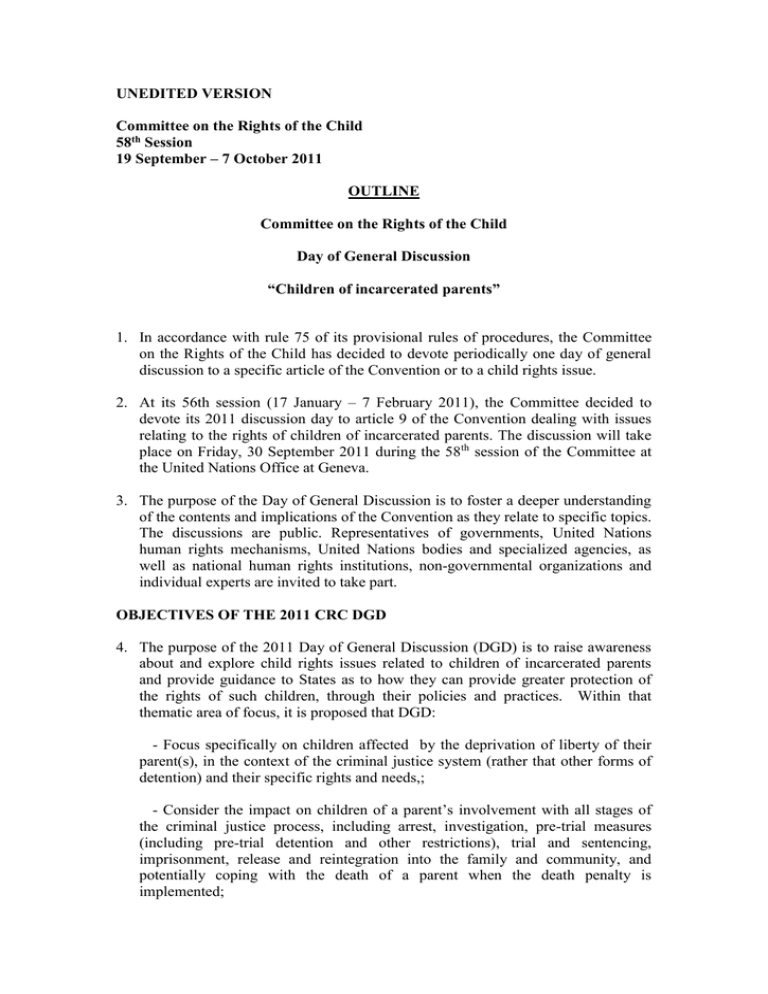
UNEDITED VERSION Committee on the Rights of the Child 58th Session 19 September – 7 October 2011 OUTLINE Committee on the Rights of the Child Day of General Discussion “Children of incarcerated parents” 1. In accordance with rule 75 of its provisional rules of procedures, the Committee on the Rights of the Child has decided to devote periodically one day of general discussion to a specific article of the Convention or to a child rights issue. 2. At its 56th session (17 January – 7 February 2011), the Committee decided to devote its 2011 discussion day to article 9 of the Convention dealing with issues relating to the rights of children of incarcerated parents. The discussion will take place on Friday, 30 September 2011 during the 58th session of the Committee at the United Nations Office at Geneva. 3. The purpose of the Day of General Discussion is to foster a deeper understanding of the contents and implications of the Convention as they relate to specific topics. The discussions are public. Representatives of governments, United Nations human rights mechanisms, United Nations bodies and specialized agencies, as well as national human rights institutions, non-governmental organizations and individual experts are invited to take part. OBJECTIVES OF THE 2011 CRC DGD 4. The purpose of the 2011 Day of General Discussion (DGD) is to raise awareness about and explore child rights issues related to children of incarcerated parents and provide guidance to States as to how they can provide greater protection of the rights of such children, through their policies and practices. Within that thematic area of focus, it is proposed that DGD: - Focus specifically on children affected by the deprivation of liberty of their parent(s), in the context of the criminal justice system (rather that other forms of detention) and their specific rights and needs,; - Consider the impact on children of a parent’s involvement with all stages of the criminal justice process, including arrest, investigation, pre-trial measures (including pre-trial detention and other restrictions), trial and sentencing, imprisonment, release and reintegration into the family and community, and potentially coping with the death of a parent when the death penalty is implemented; - Consider the impact that parental imprisonment has on different areas of the child’s life and rights: this may benefit from considering the impacts under the ‘clusters’ of Articles used in states parties’ reports. CHILDREN OF INCARCERATED PARENTS AND THE CONVENTION ON THE RIGHTS OF THE CHILD 5. Children of incarcerated parents are explicitly referred to in the Convention on the Rights of the Child only once, in Article 9. 1 However, many other Articles are relevant to their situation, including: 1 the right to non-discrimination (Art. 2); considering the child’s best interests (Art. 3); birth registration, particularly for children born to an imprisoned mother (Art. 7); family contact and reunification, particularly for children whose parents are imprisoned in another State (Art. 10); involvement in decisions relating to the child (Art. 12, particularly 12(2)); private and family life (Art. 16); parental involvement in upbringing (Art. 18); alternative care (Art. 20);2 adoption, including where parental rights are terminated as a direct or indirect result of imprisonment (Art. 21); health and healthcare (Art. 24 and 25); social security, particularly the impact of parental imprisonment on resources available to and needed by the children (Art. 26); adequate standard of living (Art. 27); education (Art. 28 and 29); leisure (Art. 31); economic exploitation (Art. 32); Article 9 states: 1. States Parties shall ensure that a child shall not be separated from his or her parents against their will, except when competent authorities subject to judicial review determine, in accordance with applicable law and procedures, that such separation is necessary for the best interests of the child. Such determination may be necessary in a particular case such as one involving abuse or neglect of the child by the parents, or one where the parents are living separately and a decision must be made as to the child's place of residence. 2. In any proceedings pursuant to paragraph 1 of the present article, all interested parties shall be given an opportunity to participate in the proceedings and make their views known. 3. States Parties shall respect the right of the child who is separated from one or both parents to maintain personal relations and direct contact with both parents on a regular basis, except if it is contrary to the child's best interests. 4. Where such separation results from any action initiated by a State Party, such as the detention, imprisonment, exile, deportation or death (including death arising from any cause while the person is in the custody of the State) of one or both parents or of the child, that State Party shall, upon request, provide the parents, the child or, if appropriate, another member of the family with the essential information concerning the whereabouts of the absent member(s) of the family unless the provision of the information would be detrimental to the well-being of the child. States Parties shall further ensure that the submission of such a request shall of itself entail no adverse consequences for the person(s) concerned. 2 This issue is also referred to in the 2009 Guidelines for the Alternative Care of Children, paragraphs 48 and 82. - use or trafficking of illicit drugs (Art. 33); and, for children living in prison with a parent, deprivation of liberty (Art. 37). 6. The Committee has itself raised issues relating to children of incarcerated parents during States’ reporting processes and covered such issues in Concluding Observations. The majority of these cover issues of babies living in prison with their mother and the inadequacy of such environments for the babies. Some also refer to vulnerability of non-imprisoned family members caused by the detention of a parent, or to situations of children in detention, which could be understood to include children detained with parents.3 APPROACHES AND OBJECTIVES FOR THE DAY OF GENERAL DISCUSSION 7. The Day of General Discussion is a valuable opportunity to improve implementation of the Convention in relation to them. This will require three stages: a. Developing awareness of child rights issues in relation to children of incarcerated parents b. Identifying principles and examples of good policies and practices in relation to children of incarcerated parents c. Disseminating this to States, UN and agency staff, local and national NGOs and other relevant stakeholders 8. There is value in giving particular focus to those issues that have proved most problematic for States Parties to address, and which would, therefore, benefit from the views and experiences of the wide range of partners the discussion day is able to bring together. However, given the low general level of knowledge regarding children of incarcerated parents, it would also be useful to provide a general overview of the most common issues to help inform stakeholders. GENERAL PRINCIPLES RELATING TO CHILDREN OF INCARCERATED PARENTS 9. The discussions that take place during the Day of General Discussion will take place in the context of the following general principles: a. Children of incarcerated parents are entitled to the same rights as all other children 3 Examples can be found for : Burundi, September 2010 (CRC/C/BDI/CO/2, paras. 62-63); UK, September 2008 (CRC/C/GBR/CO/4, paras.26-27, 44-45); Ethiopia, September 2006 (CRC/C/ETH/CO/3, paras. 49-50); Iran, January 2005 (CRC/C/15/Add.254, paras. 51-52); Philippines, May 2005 (CRC/C/15/Add.259, paras. 53-54); Sudan, September 2010 (CRC/C/SDN/CO/3-4, paras. 62-63); Thailand, January 2006 (CRC/C/THA/CO/2, paras. 47-48) and others. See annexe 1 for a full list. b. Children of incarcerated parents have committed no crime and should not suffer because of the crimes of others. Nor should they be discriminated against because of the status of their parent(s). c. Children living in prison are not prisoners and should be able to enjoy the same rights, freedoms and opportunities as other children WORKING GROUPS – SUBJECTS AND ISSUES (See Guidelines for Submissions to the 2011 CRC DGD for further details) 10. The Day of General Discussion will have two working groups, covering the following issues: Working group 1: Babies and children living with or visiting a parent in prison. Working group 2: Children left ‘outside’ when their parent is incarcerated.
